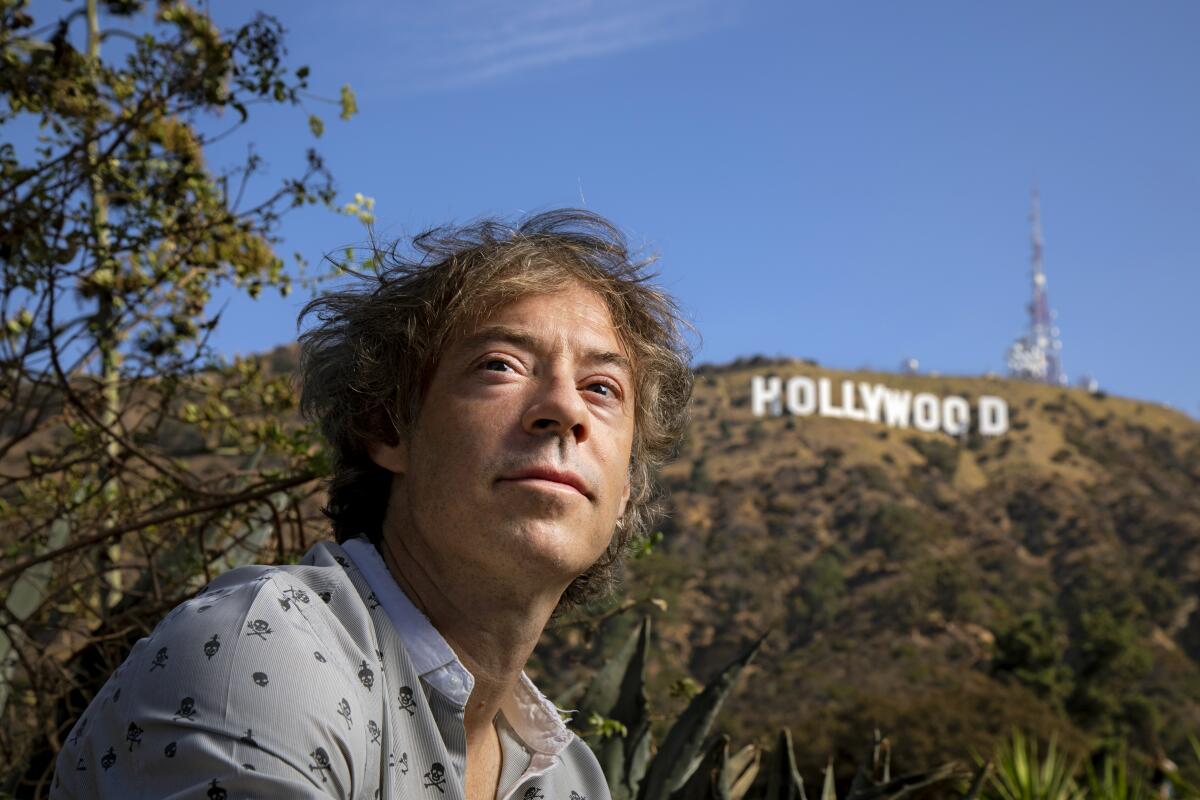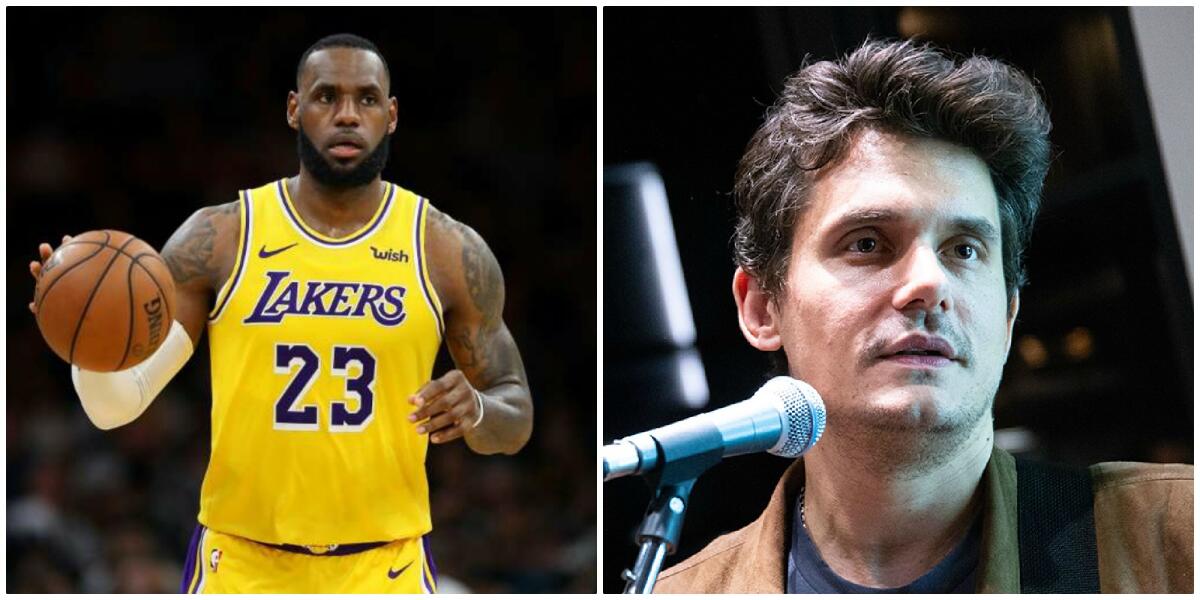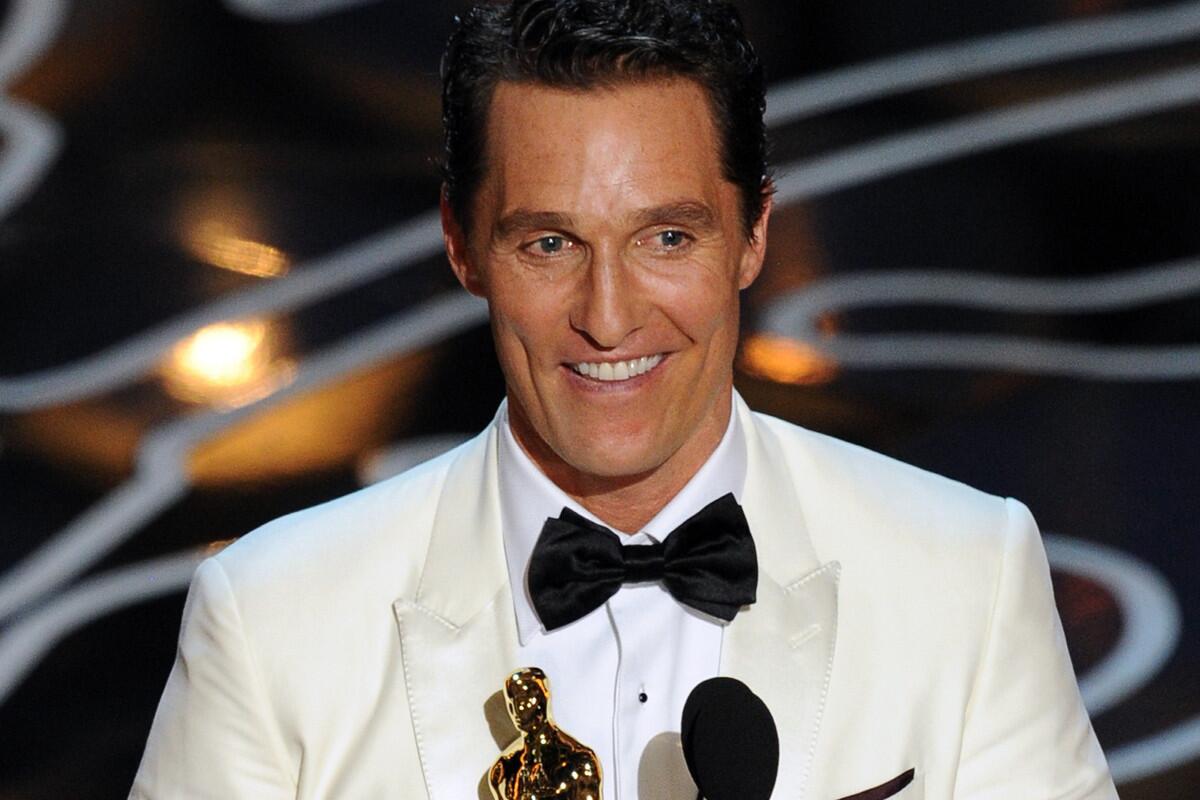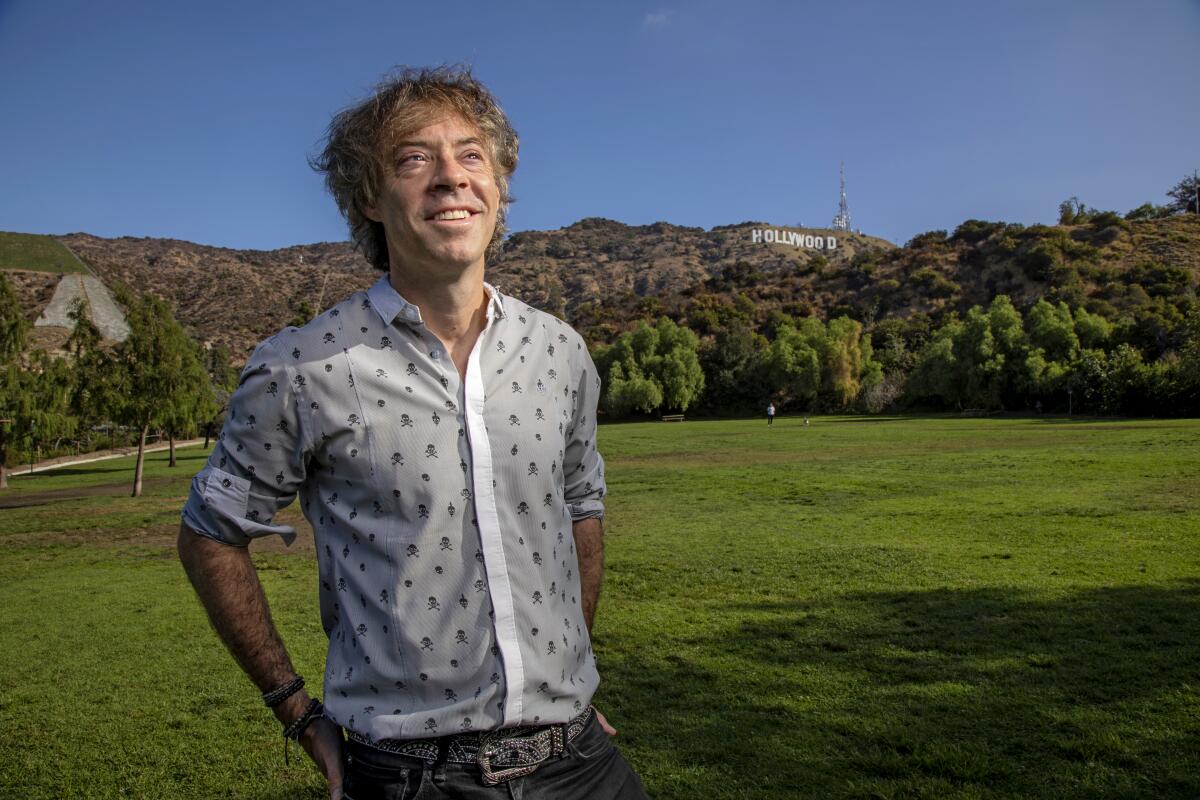Calmâs Michael Acton Smith has come to Hollywood to put audiences to sleep

With his intentionally messy hair, boyish charm and rock star wardrobe, Calm cofounder Michael Acton Smith gives off an air of a younger Mick Jagger, albeit tempered with the polite and engaging demeanor of college professor. Think Russell Brand meets Stewart Brand.
Holding court at a Soho House booth in West Hollywood on a recent afternoon, Acton Smith, 45, wears a skull-and-bones-emblazoned button-down shirt while animatedly discussing the future of global mental health. Itâs hard to imagine him being ignored. And yet the British serial entrepreneur remembers a time when this town was less than welcoming.
Several years ago, Acton Smith was the celebrated creator of U.K.-based Mind Candy, the company behind Moshi Monsters, a popular childrenâs gaming brand hailed as Tomagotchi for the internet age and valued at $200 million. In London, he was a power player. In L.A., a virtual unknown.
Acton Smith found himself mingling at a Hollywood Hills party, a scenario in which a conversation undoubtedly leads to: âAnd what do you do?â Unaccustomed to Tinseltownâs ways, he would simply say that he ran a website and entertainment company.
âI could see people just drop interest and move on,â Acton Smith recently reflected. âThey thought I was a kids entertainer, doing balloon animals.â
A friend pulled Smith aside, lambasting his âhumble British nonsense.â âYou gotta sell yourself,â the pal stressed. âTell them you have 50 million registered users and sold nearly a billion dollarsâ worth of retail products. Say youâre the Disney of digital programming.â
âIn England, if you go in guns blazing like that, people think youâre a wanker,â explained Acton Smith, using a British term that loosely translates to âjerk.â
Moshi Monstersâ numbers declined and revenue collapsed, with Acton Smith stepping down as chief executive in 2014. But he said he eventually mastered more âsalesyâ techniques for his subsequent return to California in 2012. Thatâs when he and fellow Brit Alex Tew ventured to San Francisco to cofound Calm, the popular mindfulness and sleep meditation app that now boasts a billion-dollar valuation.

These days, youâll find Acton Smith declaring Calm the future âNike of mental fitnessâ and rattling off the platformâs impressive numbers â 60 million downloads and 2 million paying subscribers. (The app is free, but users can pay $59.99 a year for premium content.) Heâll tell you of celebrity partnerships, high-powered investors and rapid international expansion.
But first, heâll tell you of Calmâs Hollywood aspirations.
The startup is moving more of its 75-person staff to L.A. to cultivate contacts and, who knows, maybe grace a red carpet or two? The company plans to re-imagine mental health through entertainment mediums in new, fun, even award-winning ways.
âWe want to be known as more than just a meditation company and a sleep company. Weâre broader than that,â said Acton Smith, adding, âand weâd also love to win some Emmys and Oscars.â
A chess drinking game
Acton Smith loves games. Heâs particularly drawn to poker or anything that requires equal amounts of risk and strategy. Growing up in Marlow, a suburb west of London, he was nearly expelled from middle school for running a gambling ring.
In fact, his first internet success involved a classic board game. In the late â90s, Acton Smith co-founded Firebox.com, a digital gadget retailer that achieved widespread attention with shot glass chess sets. Players were made to drink every time a piece was captured.
âI thought, how can we mix these two things â partying and chess?â recalled Acton Smith.
The entrepreneur infused that out-of-the-box thinking â an injection of fun that borders on slightly absurd â into his next ventures. Itâs a kooky British wit mixed with a highly competitive spirit. (Itâs no surprise that Acton Smithâs favorite TV shows include HBOâs âSuccessionâ and the quirky early aughts British comedy âIâm Alan Partridge.â)
While plenty of meditation platforms crowd the market, Calm positions itself as a modern, accessible approach to the ancient practice but with a sense of humor. The startup threw a London premiere for âBaa Baa Land,â an eight-hour slow film starring grazing sheep. It turned the boring and sleep-inducing EU GDPR legislation into an adult bedtime story. Real live sloths served as ârelaxation ambassadorsâ at its 2019 SXSW festival booth.
âCalm has a slightly rock ânâ roll creative edge that has set us apart,â said Acton Smith, whom you likely wonât ever catch on a meditation cushion (heâs far more casual about the practice). âThatâs why we love L.A. and need a much bigger presence.â
Calmâs sleep category, which includes adult iterations of bedtime stories, has become the biggest driver of growth, though the company hopes to find equal success with more categories. Smith and co-chief executive Tew have long spoken of lofty goals, which include purchasing an entire âCalm island.â But for now, Calm is focused on the music industry.
In September, pop stars Sam Smith and Sabrina Carpenter remixed recent hit songs in lullaby format for Calm. That was several months after Moby and Icelandic band Sigur RĂłs released exclusive albums on the app, establishing a new platform for artists to launch music. The last year saw more than 135 million Calm music streams.
Calm is working on original pieces with Grammy-winning country music star Keith Urban. The new music is slated for 2020.
Music, says Acton Smith, is one of the most powerful ways to help people change their emotional state. He wants to collaborate with artists for more than just altered versions of preexisting music. Calm wants to embody a new kind of label, one made to fit a new digital era.
âThe music industry feels like itâs sort of [at] a really interesting point,â said Acton Smith, referencing streaming platformsâ growth. âItâs a great time to come to artists with creative ideas.â
In the coming year, Calm plans to work with artists across numerous categories â country, pop, heavy metal, maybe even hip-hop â to create music longer than the traditional three-minute tracks. Harking back to the days of Mozart, that could mean letting artists create hours-long tracks. As Acton Smith asks, âCould we give artists the ability to create music any way they wish?â
Apart from sleep, there will be an added emphasis on new relaxation music genres, such as tracks to play during traffic, to help decompress from work or for hosting a dinner party. There might even be music designed for enhanced productivity or focus â a burgeoning field that uses rhythmic sounds to elicit specific brain states.
Calmâs head of music Courtney Phillips said she envisions the audio library as âa tool to help people live their lives in a healthier, more productive way.â
Five years ago, celebrities werenât as keen to open up about their own psychological struggles. Mental health awareness has since entered the mainstream vernacular, with everyone from politicians to Selena Gomez publicly addressing the importance of treatment and self-care.
âThis feels like an incredible cultural and societal shift that it not going to go away,â said Acton Smith.
John Mayer recommended the app to fans, tweeting, âI use it faithfully.â LeBron James relies on Calmâs ârain on leavesâ sound effect to fall asleep. Former One Direction star Harry Styles likes the app so much he became an investor.
Hollywood now throws open its doors. The cofounder acknowledges much of that interest also stems from actor Matthew McConaughey participating in Calmâs sleep stories collection. The Oscar winnerâs Southern drawl lulls millions of users to sleep, asking big-picture existential questions centered on the nature of the universe or exalting the present.

As Acton Smith attests, âa lot of stars now are approaching their agents and managers and saying âI want to do one of those.ââ
Earlier this month, Calm debuted a celebrity-focused series called âFairy Tales De-Stressed.â It features comedian Nick Offerman narrating a three-part sleep story titled âThe Big Bad Wolf Learns Anger Management,â and English actor Jerome Flynn reading âRumpelstiltskin Learns to Meditate.â
Down the line, Calm intends to pursue original television programming. Already in talks with production companies and streaming platforms, that could manifest in a number of ways, such as mental health documentaries, relaxation-inducing shows or whatever the exact opposite of âGame of Thronesâ is on a Sunday night.
âEntertainment and music specifically are really integral parts of how Calm is attempting to bridge from the idea of taking care of the mind and then making that accessible to people,â said cofounder Tew. âL.A. has this amazing pull for us because of the access to talent and partners.â
To that end, Calm is moving toward two centers of gravity â one in L.A., the other in San Francisco.

Not that the cofounders are naive of the challenges and risks inherent in entertainment programming. Acton Smith readily admits he still possesses the âbattle scarsâ from the Mind Candy collapse, noting âyou can be hot one minute and not the next. Youâre constantly needing to come up with your next hit.â
That saga humbled him, though it didnât deter his passion for the entertainment industry. Acton Smith thinks heâll have more luck with a meditation company than childrenâs gaming, especially because of startling stats like this one: The U.S. is one of the most stressed nations in the world, with more than half of Americans reporting moderate to high stress in 2018, according to a Gallup poll. And itâs not just us: The World Health Organization dubbed stress the health epidemic of the 21st century.
âPeople will need ways to reduce stress, sleep better and handle anxiety,â said Acton Smith. âAnd given the always-on society we live in, weâll need companies that will help us deal with all that. Calm doesnât feel like a fad. This feels like a business that we can lean into.â
More to Read
Sign up for The Wild
Weâll help you find the best places to hike, bike and run, as well as the perfect silent spots for meditation and yoga.
You may occasionally receive promotional content from the Los Angeles Times.










